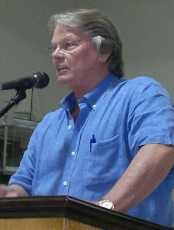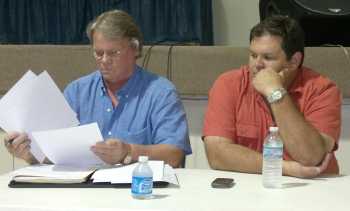Archive for July 19th, 2012

Referendum not binding, Brackers told before ballot
 (CNS): The one man, one vote (OMOV) campaign was launched in Cayman Brac just 36 hours before polls opened on Referendum Day with a meeting hosted by PPM representative Moses Kirkconnell and members of the OMOV grassroots movement. While the question of equality in giving each voter one vote was largely supported by the 100 or so Brackers at the meeting, there appeared to be very little support for introducing more accountability to the job of representing the district by dividing it into two single member constituencies (SMC). However, Kirkconnell made it clear that the referendum result was not binding and that the government would have absolute say over what, if any, changes would be made to the election law and when they would be implemented, regardless of the result. (Photos by James Tibbetts)
(CNS): The one man, one vote (OMOV) campaign was launched in Cayman Brac just 36 hours before polls opened on Referendum Day with a meeting hosted by PPM representative Moses Kirkconnell and members of the OMOV grassroots movement. While the question of equality in giving each voter one vote was largely supported by the 100 or so Brackers at the meeting, there appeared to be very little support for introducing more accountability to the job of representing the district by dividing it into two single member constituencies (SMC). However, Kirkconnell made it clear that the referendum result was not binding and that the government would have absolute say over what, if any, changes would be made to the election law and when they would be implemented, regardless of the result. (Photos by James Tibbetts)
Cayman Brac and Little Cayman had the lowest turnout of all the districts with less than 50% of registered voters turning up to vote at the polls Wednesday.
Even if the ‘yes’ vote for OMOV and SMC prevailed in the national ballot, the Brac voters could still make representation to the government as to what system they wanted for the district, Kirkconnell suggested.
“If the referendum passes, it still does not bind government to institute a division of the island,” the Brac MLA said, echoing, but not countering, the UDP’s simpler anti-OMOV and -SMC message that it would split the island. He said the election law, which governs the voting system, is controlled by the legislature and any changes to it would be the burden of the government that is in power, not the opposition.
 Retired attorney Wayne Panton (right with Moses Kirkconnell), who is expected to run in the next general election on the PPM ticket, noted that the referendum question “does not specifically commit the government to too much and does not commit them to implement anything by the 2012 election," though several Cabinet ministers had given verbal assurances that the results would be honoured by government, he said.
Retired attorney Wayne Panton (right with Moses Kirkconnell), who is expected to run in the next general election on the PPM ticket, noted that the referendum question “does not specifically commit the government to too much and does not commit them to implement anything by the 2012 election," though several Cabinet ministers had given verbal assurances that the results would be honoured by government, he said.
Two more attorneys on the platform, Marco Archer and Andre Ebanks, agreed that there was nothing legally binding about the results of the national ballot, since it was a government-initiated referendum and not, as had been intended by the petition for the national ballot for OMOV, a people-initiated referendum.
In addition, it was "drafted loosely", Ebanks said, “although if it was passed, government would find it very difficult to resist 50% plus one of the voters,” he added.
However, Kirkconnell also said that when the OMOV petition had been launched by the campaigners, there had been two petitions in Cayman Brac, one asking for 18 single member constituencies and the other asking for 16 SMC on Grand Cayman but leaving Cayman Brac as a single vote, multi-member district. The OMOV group had agreed to the variance in voting systems, he said.
Joining Kirkconnell and the three attorneys on the platform to present the last minute case for the referendum question were Kenneth Bryan, a former TV presenter and possible candidate at the next election, and Jonathan Tibbetts, general manager of CB&LC Power & Light Company.
One question put to the panel was what could be done to remove an elected representative from the Legislative Assembly mid-term. “Some stuff has gone on in the last couple of years,” the Brac resident said, adding that “more mischief could go on over the next 6 months.”
The new constitution was a step in the right direction, Archer told him, but said an amendment was needed to include a recall provision for representatives “who are a mistake”. He said, “You do not know what someone is capable of until they are elected. It is incumbent on each of us to take the first step and vote ‘yes’ on Wednesday to send a clear message that we, the people, have woken up.”
He said, “We need to have people in the House who put country before self and are willing to put a recall provision in the constitution. No price is too great to pay for democracy and proper representation.”
Returning to the theme of accountability, Archer said that SMCs would result in “more intimate relationships between the electorate and their representatives,” who would get constant feedback from the constituents and would have to engage in dialogue with them.
Referring to single member constituencies, local businessman Elvis McKeever noted that this was already going on in the district because during elections supporters of one politician urged voters to use only one of their two votes anyway.
Andre Ebanks said that in his district of West Bay, SMC would make a huge difference because it would identify who is answerable to him.
However, while keeping the district united was the popular opinion of attendees at the meeting, the panel did not offer a case for why the Sister Islands should be an exception to the referendum question put to the electorate on Wednesday or why the arguments for greater accountability with SMCs did not apply to Cayman Brac and Little Cayman.